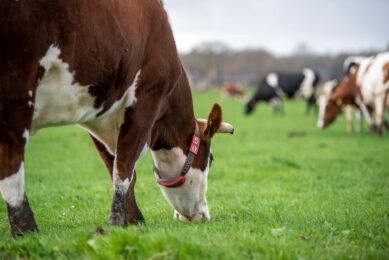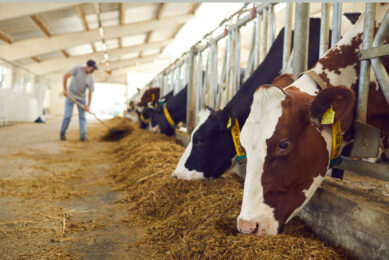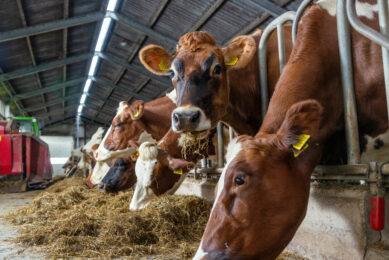Global round-up: Methane-reducing additives for dairy cattle
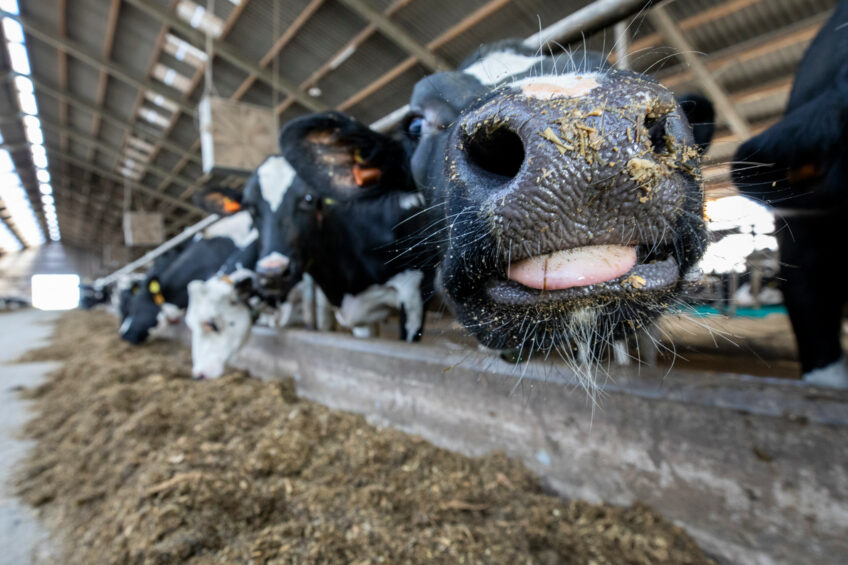
A look at feed additives and research initiatives for reducing methane emissions from cattle.
By mid-2024, 6 of the world’s biggest dairy companies will begin publicly disclosing their methane emissions. At COP28, Danone, Nestle, General Mills, Lactalis USA, Kraft Heinz and Bel Group all agreed that by June or July this year, they would begin both reporting emissions and developing reduction action plans.
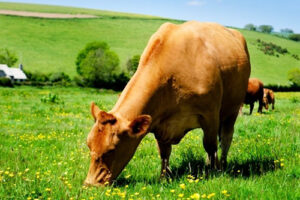
As is well known, over the long term, methane emissions have a much strong negative impact on climate change than CO2 emissions. Large amounts of methane are produced by dairy cattle through ruminal digestion and burping (known as enteric methane production) and also through emissions from manure.
It may be possible, according to livestock genetics firm Semex, to reduce enteric methane production through genetic selection by 20-30% over the next 25 years.
However, feed additives are being actively currently pursued as a solution. These include seaweed, methanogenesis inhibitors, essential oils, organic acids probiotics and antimicrobials.
Here is an exclusive global round-up of products already on the market and those in development, as well as recent research initiatives into methane-reducing compounds.
Red seaweed
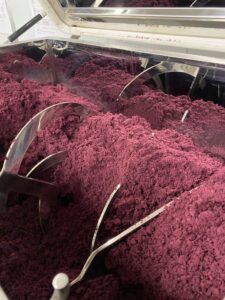
There are numerous published and ongoing studies showing that feeding red seaweed (Asparagopsis sp.) in small amounts cuts enteric methane emissions. In dairy cows, these include the initial study in 2019 and another short-term study with lactating cows led by Dr Alexander Hristov at Penn State University, which demonstrated 80% less methane with no effect on feed intake or milk yield. Other studies have been done on beef cattle in feedlots. A feedlot trial in Australia conducted over 300 days and led by an organisation called FutureFeed showed a 28% emissions reduction, but other studies have shown much higher reductions.
FutureFeed is a partnership among the Commonwealth Scientific and Industrial Research Organisation, Meat and Livestock Australia and James Cook University. It holds the global intellectual property rights for the use of Asparagopsis as a livestock feed ingredient. It has licenced the following companies to market Asparagopsis feed additive products:
Tasmania, Australia-based Sea Forest is replicating the compounds in Asparagopsis and is placing them into products in the form of oil, pellets and lick blocks, all marketed under the Seafeed brand. About 30 peer-reviewed studies have shown that a small dietary inclusion of Seafeed can achieve a methane reduction between 43% to 80%. Sea Forest has partnered with Fonterra, Australia’s largest dairy processor on trials, and Fonterra has been using the additive on its farms since 2020. These trials have shown no effect on the taste or quality of milk and feed conversion improvements of up to 10%.
Indeed, the Asparagopsis feed additive has been used by livestock farmers in Australia for the past 4 years, says Sam Elsom, CEO of Sea Forest. “We have the capacity to reach a commercial volume sufficient to supplement four million head of livestock a year,” he explains. “We have ambitions to sell the product internationally and are in advanced talks with prospective customers in Europe, the UK and elsewhere.”
Products derived from Asparagopsis fed cattle
The world’s first commercially-available milk product derived entirely from dairy cattle fed on the Asparagopsis feed additive hit the shelves in Australia in March 2024: Ashgrove Eco-Milk, from the Tasmanian dairy producer Ashgrove Cheese.
It joins a number of high-profile consumer products already for sale in Australia that come from cattle and sheep fed on Seafeed. “These include the ‘GameChanger’ beef burger from Australian burger chain Grill’d, and carbon-neutral knitwear from the Australian menswear brand, M.J.Bale,” says Elsom. “These partnerships demonstrate to farmers that the product is safe, it works and there is a ready market for methane-abating meat and milk products. They also help educate consumers about methane and show that they can play an active role in reducing greenhouse gas emissions.”
‘Methane Tamer’
Also in Australia, CH4 Global offers the product ‘Methane Tamer.’ The company has started construction in Louth Bay, South Australia on what it claims will be the world’s first commercial-scale facility for growing Asparagopsis. The plant is scheduled to begin operations in the fourth quarter of this year and will produce enough Methane Tamer to supply up to 30,000 cattle per day. There have not yet been any studies on specifically how much the additive reduces methane emissions in cattle. The product has a coarseness similar to instant coffee.
As part of a partnership with CirPro, an Australian cattle processor, in January 2024 CH4 Global delivered its first commercial quantities of Methane Tamer for feedlot application. “We have also signed a letter of intent to furnish a South Korean conglomerate, Lotte, with Methane Tamer,” says spokesperson Greg Frost. “Under the terms of that partnership, Lotte would initially receive enough supply to feed up to 7,000 head of cattle, primarily Wagyu beef, and eventually up to 4 million cattle.” CH4 Global has also signed an agreement with Ravensworth, an Australian agribusiness whose operations include a 40,000-head feedlot, to begin deliveries of the additive within the coming year.
Other companies in Australia marketing Asparagopsis products include SeaStock, Immersion Group and CleanEyre Global.
A startup company in Australia named Rumin8 has not yet launched products, but has been testing its synthetically-replicated versions of the active compounds (tribromomethane) present in red seaweed for some time. Trials have consistently demonstrated up to 90% reduction in enteric methane production, with ongoing trials also demonstrating productivity gains of up to 9% in grain-fed cattle and grass-fed cattle.
The company is currently developing products in water-soluble form (for water feeding), oil, solid (for supplements, licks and adding to Total Mixed Ration) and slow-release forms. Registration of the first product is hoped for by the end of 2025. The company opened a demonstration plant in Perth, Australia in January 2024.

Sweden
Feeding Volta Greentech’s powdered red seaweed product ‘Lome’, has been shown in trials to reduce methane on beef farms from 70% to 90%. In collaboration with partners, the commercial trials were done on the Ejmunds Gård farm on Gotland and are third-party verified.
In what it claims is the world’s first methane-reduced beef, Volta Greentech launched Lome-branded beef over the past 2 years at 23 retail stores and various restaurants in Sweden.
This was achieved in collaboration with partners such as the beef company Protos and retailers Coop and Axel Johnson Group. “Following these successful pilot trials, we have now signed a deal with Protos so they can start implementing our additives on a commercial scale,” says Business Developer Cora Taylor. “We have initially focused on beef, but we will also be working with dairy in the near future.” Volta Greentech will also conduct a pilot project in the UK this year.
North America
Synergraze in Canada claims it has developed a proprietary process that enhances the bioactivity of multiple strains of Asparagopsis, including those native to Pacific Northwest waters. Synergraze is working in partnership with the T’Sou-ke First Nation, with a pilot production site on the T’Sou-ke reserve. The company did not respond to requests for details.
In the USA, 2 firms in Hawaii are marketing red seaweed products, Symbrosia and Blue Ocean Barns, but they also did not respond.
3-NOP
A molecule called 3-nitrooxypropanol (3-NOP) inhibits an enzyme called methyl-coenzyme M reductase, which is directly involved in the biological synthesis and anaerobic oxidation of methane in the rumen.
dsm-firmenich markets Bovaer 10, which contains 10% 3-NOP and has been shown with over 50 on-farm trials and more than 50 peer-reviewed publications to provide an average reduction of 30% less methane emission from dairy cows and 45% for finishing beef cattle. It is now authorised and available for sale globally, including in the EU, USA, Australia, Brazil, Chile, Pakistan, Switzerland and Turkey.
Garlic and citrus
The company Mootral in the UK offers a natural feed supplement that reduces methane emissions from cattle. A proprietary combination of garlic (Allium sativum) and citrus extract (Citrus aurantium) favourably alters the ruminants microbiome, reducing methanogenesis without compromising the animals health or well-being. Extensive research has found this reduces methane emissions by up to 38% on commercial farms.
It has also been shown to improve animal health and increase milk yields. Mootral-fed herds saw significant decreases in the incidences of mastitis and milk fever, falling by 18% and 35%, respectively. This improvement in animal health came alongside increased milk yields by 3.3% to 17.8% (+one litre/cow/day).
Patented technology
Cargill’s Provimi division in the UK markets SilvAir, which reduces enteric methane production by up to 10%. The solution contains an EU-patented technology that stimulates a natural process in the rumen, creating ammonia from hydrogen that would otherwise become methane. This ammonia can subsequently be used to produce milk protein. Cargill recommends that the additive is included at a maximum inclusion rate of 1.6% of the total dietary dry matter of a dairy cow. It is proven to be safe and effective at this level – the rate should be adhered to carefully, and Cargill recommends it only for use in compound feeds.
Research initiatives
A group of scientists from Volga Research Medical University in Russia has developed a feed additive from wood waste that produced not only a 30% drop in methane emissions from dairy cows but a 12% rise in milk yields. The new feed additive is produced at the timber and chemical enterprise Scientific and Technical Center Khiminvest.
Scientists in Serbia have found that brown algae, garlic and tannins can reduce methane emissions. They can also be reduced (in relation to unit of milk produced) through other additives such as trace minerals that significantly improve dairy cows’ feed efficiency.
A government-funded project in Ireland called Meth-Abate is focused on evaluating and developing promising feed and manure additives. The project has demonstrated a feed additive that can reduce methane emissions by 28% in beef cattle. The research is now progressing to further validate this and to investigate the potential for it to be formulated in pellet form or as a bolus for longer-lasting effects.
Join 13,000+ subscribers
Subscribe to our newsletter to stay updated about all the need-to-know content in the dairy sector, two times a week.




